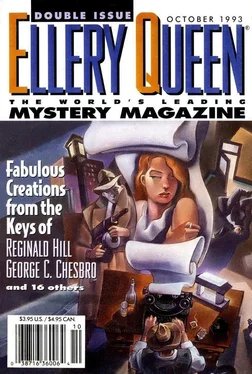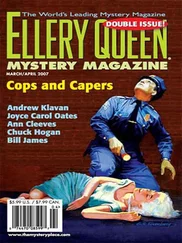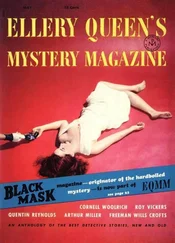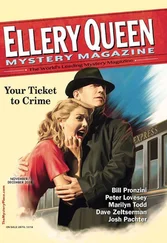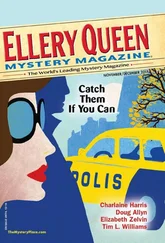Charles Ardai - Ellery Queen’s Mystery Magazine. Vol. 102, No. 4 & 5. Whole No. 618 & 619, October 1993
Здесь есть возможность читать онлайн «Charles Ardai - Ellery Queen’s Mystery Magazine. Vol. 102, No. 4 & 5. Whole No. 618 & 619, October 1993» весь текст электронной книги совершенно бесплатно (целиком полную версию без сокращений). В некоторых случаях можно слушать аудио, скачать через торрент в формате fb2 и присутствует краткое содержание. Город: New York, Год выпуска: 1993, Издательство: Davis Publications, Жанр: Детектив, на английском языке. Описание произведения, (предисловие) а так же отзывы посетителей доступны на портале библиотеки ЛибКат.
- Название:Ellery Queen’s Mystery Magazine. Vol. 102, No. 4 & 5. Whole No. 618 & 619, October 1993
- Автор:
- Издательство:Davis Publications
- Жанр:
- Год:1993
- Город:New York
- ISBN:нет данных
- Рейтинг книги:3 / 5. Голосов: 1
-
Избранное:Добавить в избранное
- Отзывы:
-
Ваша оценка:
- 60
- 1
- 2
- 3
- 4
- 5
Ellery Queen’s Mystery Magazine. Vol. 102, No. 4 & 5. Whole No. 618 & 619, October 1993: краткое содержание, описание и аннотация
Предлагаем к чтению аннотацию, описание, краткое содержание или предисловие (зависит от того, что написал сам автор книги «Ellery Queen’s Mystery Magazine. Vol. 102, No. 4 & 5. Whole No. 618 & 619, October 1993»). Если вы не нашли необходимую информацию о книге — напишите в комментариях, мы постараемся отыскать её.
Ellery Queen’s Mystery Magazine. Vol. 102, No. 4 & 5. Whole No. 618 & 619, October 1993 — читать онлайн бесплатно полную книгу (весь текст) целиком
Ниже представлен текст книги, разбитый по страницам. Система сохранения места последней прочитанной страницы, позволяет с удобством читать онлайн бесплатно книгу «Ellery Queen’s Mystery Magazine. Vol. 102, No. 4 & 5. Whole No. 618 & 619, October 1993», без необходимости каждый раз заново искать на чём Вы остановились. Поставьте закладку, и сможете в любой момент перейти на страницу, на которой закончили чтение.
Интервал:
Закладка:
Billy Hatcher was still living because of the buffer the steering wheel made, but though that was certainly lucky, it made him guilty, too, of driving too fast and trespassing (hunk where he shouldn’t have been, and in Roy Ashton’s truck, which he hadn’t even bothered to borrow.
The Bledsoe boys’ parents vowed never to forgive Billy Hatcher, and as bad feeling spread, families and friends were split apart taking sides, those who thought Billy ought to go to jail, and those who thought he was too young to be responsible. It depended on how you viewed sixteen.
I didn’t know all this at first, when I bought the bottom fields and moved into Pumpkin Valley — only that there was division and I would be expected to take sides eventually. I was newly widowed, and wanted only to find peace and hope. It was in all innocence that I let Billy Hatcher, by then eighteen, come to work for me — and Betty Bledsoe, the dead boys’ mother, drive for me. I knew she had suffered a tragedy, but I didn’t know what, and I knew Billy Hatcher wasn’t well liked, but I didn’t know why. I sensed there was something explosive waiting to happen in our valley, but I certainly didn’t expect to fuel it.
The trouble began because I was fond of the groundhogs and I didn’t want anybody to kill them. It pained me to see them in the roadside stands, stuffed as souvenirs, wearing doll sunglasses and little baseball caps. I figured we farmers planted enough to share a little, and now that I owned the bottoms I kept a gate up to keep people out. But boys still slipped down there to shoot at the groundhogs — often just for target practice. Nobody seemed to eat the meat anymore. I resented the killing and determined to put a stop to it. But with the first No Hunting sign I made enemies. Some of my neighbors grew silent, and some of the mothers came at me like bantam hens protecting the rights of their dibs. “My Kenny’s been hunting down there all his life,” they’d say, or, “My Chad don’t bother nobody by huntin’ down there.”
“It bothers me ,” I’d say, “and it certainly bothers the groundhogs!”
Betty Bledsoe, surprisingly, took my side, taking up the cause of the groundhogs. “I hate to hear all the shooting and noise down there,” she confided. “That place ought to be left in peace.” This she said while driving me to church, prim in her habitual colors, red, white, and blue.
Granny Endower, our guest in the backseat, observed, slowly and meaningfully, “Groundhogs ain’t got souls. What does it matter?”
“God instructed Noah to take the animals into his care,” I countered. “That’s what I’m doing.”
On the way home, once Granny Endower had been let out, Betty Bledsoe, between slow tears, told me about her boys.
So when Billy Hatcher came to me later that week asking permission to go nights to the bottom fields — he didn’t want to hunt, he said, he just wanted to sit and think and listen to the night sounds — I acquiesced. I thought I understood. It was the place of his guilt, and he needed to come to terms with it. “Of course,” I said, with empathy.
Now and then I heard a blast or a blam and figured the groundhogs’ ranks were being depleted by some quick trespasser, but not often. It was frustrating knowing I couldn’t get down there quickly enough to catch anyone, living up the mountain above the parsonage as I did, and I could no longer depend on Ladson to keep an eye out, he having been sent away to an institution. But most of the boys seemed to stay away, and whenever I passed the field two or three of the funny furry groundhogs always sat up from their foraging, like alert sentries. I heard an occasional rumor that someone was setting traps for them, but I had no proof.
Billy Hatcher with his red hair and special guilt was the only one I permitted to go down there, and, in a quiet moment, I told Betty Bledsoe about his request and my reasoning.
My comments seemed to make an impression. Betty was — or had been — a mother. Now she had no sons to fuss over. Billy, perhaps because he had so few friends, seemed to be maturing into a responsible if reticent young man. He looked, to me, like an angel ordained against his will, with his fiery red hair and his quick temper suppressed now by determined quiet words and attention to whatever he considered duty.
I’d heard he had never known much love in his upbringing, and I began to fantasize that he and Betty would between them form some shared bond from their tragedy. It would help assuage his guilt, and her now childless loneliness. And so I was pleased when Betty began coming by afternoons while Billy was still there. That first time she nodded at him, the merest of greetings, I felt my heart lift in a way it had not lifted for years. I almost felt I could believe in peace and hope again, in happy endings. When I saw Billy striking out across the bottoms in late summer, groundhogs making an occasional dark shadow on the stubble before him, and Betty, parked in her car at sunset, looking out and down at that place where her sons drew their last breaths, I felt overjoyed that I’d helped ease the terrible tension between them.
Not many nights after, the explosion of a double-barreled shotgun woke me. It was the close of an Indian summer night, a faint rosy hue was beginning to lift the darkness, and only my thudding heart spoke of terror. Then Blam! Blam! the gun sounded again, too close. The bottoms? I covered my head with the pillow and must have dozed. I woke to a sound even more unfamiliar to our valley — that of a siren.
I got up, put on a warm robe and my glasses, and went out on the porch. I could see a flashing light below the parsonage. Then the EMS ambulance started up, returning to town — but slowly, without the siren. I watched it cross the gap. Another siren approached — the deputy’s car? I thought about dressing, going down to the bottoms to see what had happened, but I knew that Granny Endower would call me soon enough with the news.
Until then, I went into the kitchen to make some coffee, and I was there when Betty Bledsoe knocked at the front door. I might not have recognized her, but for the familiar red, white, and blue she wore. She stood there, disheveled, a stranger in her swaying stance, with the gun and heavy towsack she carried. Blood dripped from it onto the porch floor that Billy had painted and kept so carefully clean for me.
“There’s groundhogs in here!” Betty’s eyes and face blazed. She must have run all the way from the bottoms carrying the heavy dripping sack, she was so winded and red. “Do you understand me?” she pleaded. “Groundhogs!”
I looked at her uncomprehendingly.
“That’s all he was doing, all he was going to the bottoms for, all that time... trapping the groundhogs!”
“Who?” I asked weakly.
“Billy Hatcher! One of the traps was right there where the truck went in, where my boys... There was a groundhog caught, chewing its foot off, when along he comes, checking the traps, whistling...”
She handed me the sack. I staggered back from the weight, blood dripping now inside my clean house.
“The ambulance?” I asked dully.
“So I shot him. I killed him! What else could I do?” She threw up her hands wildly. “He was killing the groundhogs!”
A Script for the President
by William Bankier
© 1993 by William Bankier
This year the real president of the United States was honored by the Mystery Writers of America as its Reader of the Year. The revelation that Mr. Clinton loves a mystery must have brought him a lot of mail from aspiring writers. We hope none of them proves as persistent as the scriptwriter of Mr. Bankier’s story...
Читать дальшеИнтервал:
Закладка:
Похожие книги на «Ellery Queen’s Mystery Magazine. Vol. 102, No. 4 & 5. Whole No. 618 & 619, October 1993»
Представляем Вашему вниманию похожие книги на «Ellery Queen’s Mystery Magazine. Vol. 102, No. 4 & 5. Whole No. 618 & 619, October 1993» списком для выбора. Мы отобрали схожую по названию и смыслу литературу в надежде предоставить читателям больше вариантов отыскать новые, интересные, ещё непрочитанные произведения.
Обсуждение, отзывы о книге «Ellery Queen’s Mystery Magazine. Vol. 102, No. 4 & 5. Whole No. 618 & 619, October 1993» и просто собственные мнения читателей. Оставьте ваши комментарии, напишите, что Вы думаете о произведении, его смысле или главных героях. Укажите что конкретно понравилось, а что нет, и почему Вы так считаете.
